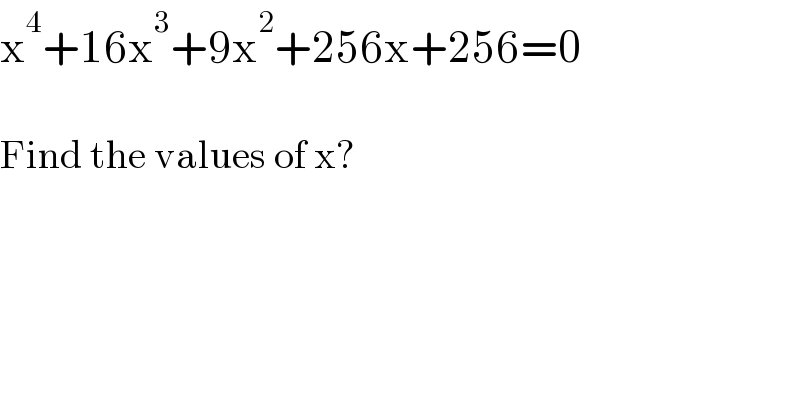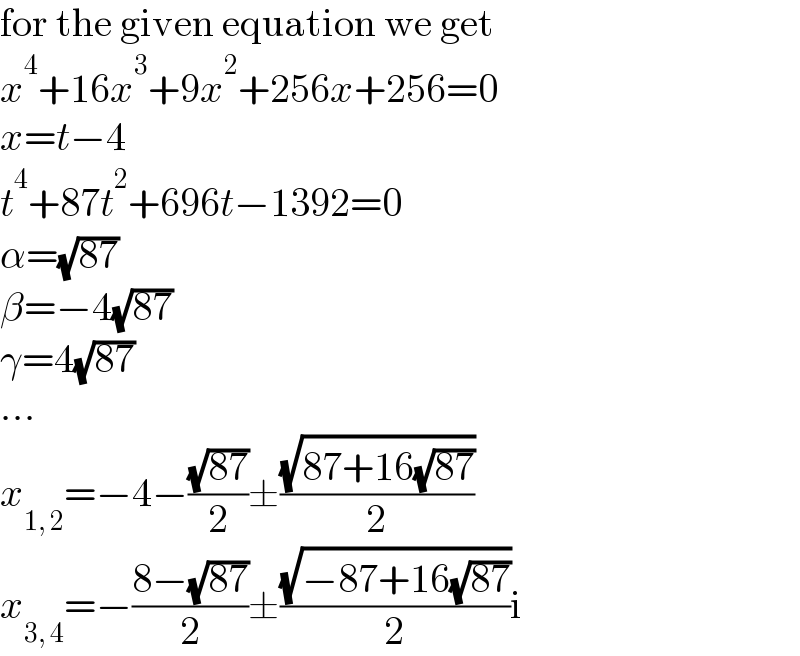
Question Number 184787 by Mastermind last updated on 11/Jan/23

$$\mathrm{x}^{\mathrm{4}} +\mathrm{16x}^{\mathrm{3}} +\mathrm{9x}^{\mathrm{2}} +\mathrm{256x}+\mathrm{256}=\mathrm{0} \\ $$$$ \\ $$$$\mathrm{Find}\:\mathrm{the}\:\mathrm{values}\:\mathrm{of}\:\mathrm{x}? \\ $$
Commented by MJS_new last updated on 11/Jan/23

$$\mathrm{I}\:\mathrm{explained}\:\mathrm{this}\:\mathrm{many}\:\mathrm{times}\:\mathrm{before} \\ $$$${x}^{\mathrm{4}} +{ax}^{\mathrm{3}} +{bx}^{\mathrm{2}} +{cx}+{d}=\mathrm{0} \\ $$$$\left(\mathrm{1}\right) \\ $$$$\mathrm{try}\:\pm\mathrm{factors}\:\mathrm{of}\:\mathrm{the}\:\mathrm{constant}\:{d} \\ $$$$\mathrm{if}\:\mathrm{you}\:\mathrm{don}'\mathrm{t}\:\mathrm{succeed}: \\ $$$$\left(\mathrm{2}\right) \\ $$$$\mathrm{let}\:{x}={t}−\frac{{a}}{\mathrm{4}}\:\mathrm{to}\:\mathrm{get} \\ $$$${t}^{\mathrm{4}} +{pt}^{\mathrm{2}} +{qt}+{r}=\mathrm{0} \\ $$$$\mathrm{we}'\mathrm{re}\:\mathrm{trying}\:\mathrm{to}\:\mathrm{find}\:\mathrm{2}\:\mathrm{square}\:\mathrm{factors} \\ $$$$\left({t}^{\mathrm{2}} −\alpha{t}−\beta\right)\left({t}^{\mathrm{2}} +\alpha{t}−\gamma\right)=\mathrm{0} \\ $$$$\Leftrightarrow \\ $$$${t}^{\mathrm{4}} −\left(\alpha^{\mathrm{2}} +\beta+\gamma\right){t}^{\mathrm{2}} +\alpha\left(\gamma−\beta\right){t}+\beta\gamma=\mathrm{0} \\ $$$$\mathrm{by}\:\mathrm{comparing}\:\mathrm{the}\:\mathrm{constants}\:\mathrm{we}\:\mathrm{get} \\ $$$$\begin{cases}{−\left(\alpha^{\mathrm{2}} +\beta+\gamma\right)={p}}\\{\alpha\left(\gamma−\beta\right)={q}}\\{\beta\gamma={r}}\end{cases} \\ $$$$\mathrm{solve}\:\left(\mathrm{1}\right)\:\mathrm{and}\:\left(\mathrm{2}\right)\:\mathrm{for}\:\beta\:\mathrm{and}\:\gamma \\ $$$$\mathrm{then}\:\mathrm{insert}\:\mathrm{in}\:\left(\mathrm{3}\right)\:\mathrm{and}\:\mathrm{transform}\:\mathrm{to}\:\mathrm{get} \\ $$$$\left(\alpha^{\mathrm{2}} \right)^{\mathrm{3}} +{j}\left(\alpha^{\mathrm{2}} \right)^{\mathrm{2}} +{k}\left(\alpha^{\mathrm{2}} \right)+{l}=\mathrm{0} \\ $$$$\mathrm{if}\:\mathrm{this}\:\mathrm{has}\:\mathrm{got}\:\mathrm{at}\:\mathrm{least}\:\mathrm{one}\:\mathrm{nice}\:\mathrm{solution}\:\mathrm{for} \\ $$$$\alpha^{\mathrm{2}} \:\mathrm{we}\:\mathrm{get}\:\mathrm{nice}\:\mathrm{solutions}\:\mathrm{for}\:{t}^{\mathrm{2}} −\alpha{t}−\beta=\mathrm{0}\:\mathrm{and} \\ $$$${t}^{\mathrm{2}} +\alpha{t}−\gamma=\mathrm{0}\:\mathrm{and}\:\mathrm{also}\:\mathrm{for}\:{x}.\:\mathrm{if}\:\mathrm{there}'\mathrm{s}\:\mathrm{no}\:\mathrm{nice} \\ $$$$\mathrm{solution}\:\mathrm{for}\:\alpha^{\mathrm{2}} \:\mathrm{it}'\mathrm{s}\:\mathrm{better}\:\mathrm{to}\:\mathrm{approximate} \\ $$$$\mathrm{for}\:{x}\:\mathrm{from}\:\mathrm{the}\:\mathrm{given}\:\mathrm{equation}. \\ $$
Commented by MJS_new last updated on 11/Jan/23

$$\mathrm{for}\:\mathrm{the}\:\mathrm{given}\:\mathrm{equation}\:\mathrm{we}\:\mathrm{get} \\ $$$${x}^{\mathrm{4}} +\mathrm{16}{x}^{\mathrm{3}} +\mathrm{9}{x}^{\mathrm{2}} +\mathrm{256}{x}+\mathrm{256}=\mathrm{0} \\ $$$${x}={t}−\mathrm{4} \\ $$$${t}^{\mathrm{4}} +\mathrm{87}{t}^{\mathrm{2}} +\mathrm{696}{t}−\mathrm{1392}=\mathrm{0} \\ $$$$\alpha=\sqrt{\mathrm{87}} \\ $$$$\beta=−\mathrm{4}\sqrt{\mathrm{87}} \\ $$$$\gamma=\mathrm{4}\sqrt{\mathrm{87}} \\ $$$$... \\ $$$${x}_{\mathrm{1},\:\mathrm{2}} =−\mathrm{4}−\frac{\sqrt{\mathrm{87}}}{\mathrm{2}}\pm\frac{\sqrt{\mathrm{87}+\mathrm{16}\sqrt{\mathrm{87}}}}{\mathrm{2}} \\ $$$${x}_{\mathrm{3},\:\mathrm{4}} =−\frac{\mathrm{8}−\sqrt{\mathrm{87}}}{\mathrm{2}}\pm\frac{\sqrt{−\mathrm{87}+\mathrm{16}\sqrt{\mathrm{87}}}}{\mathrm{2}}\mathrm{i} \\ $$
